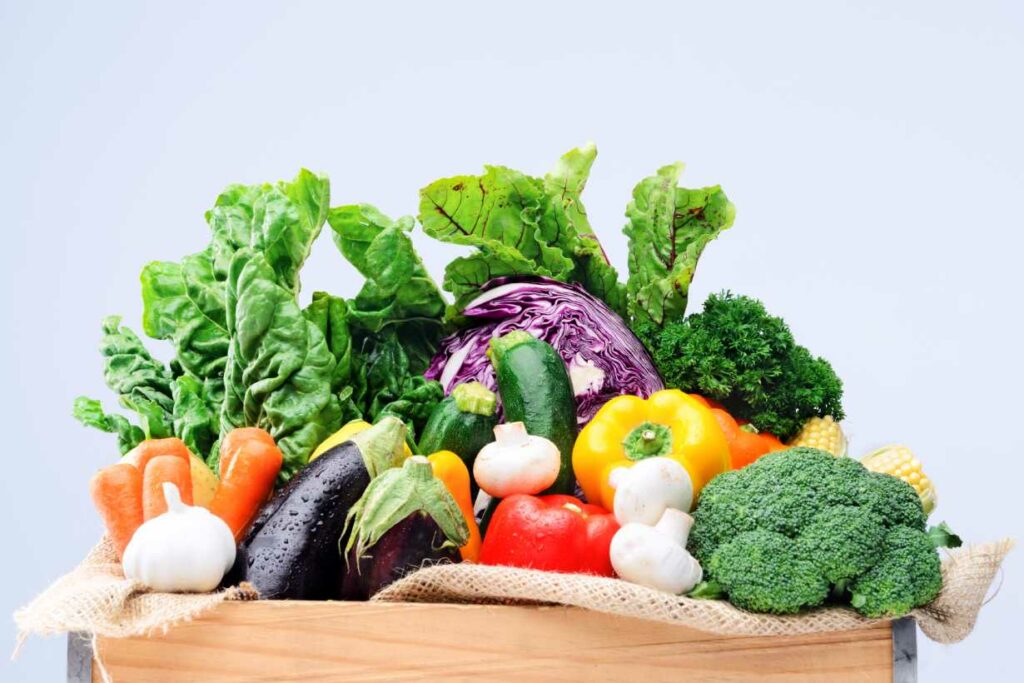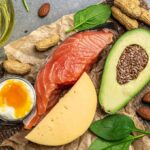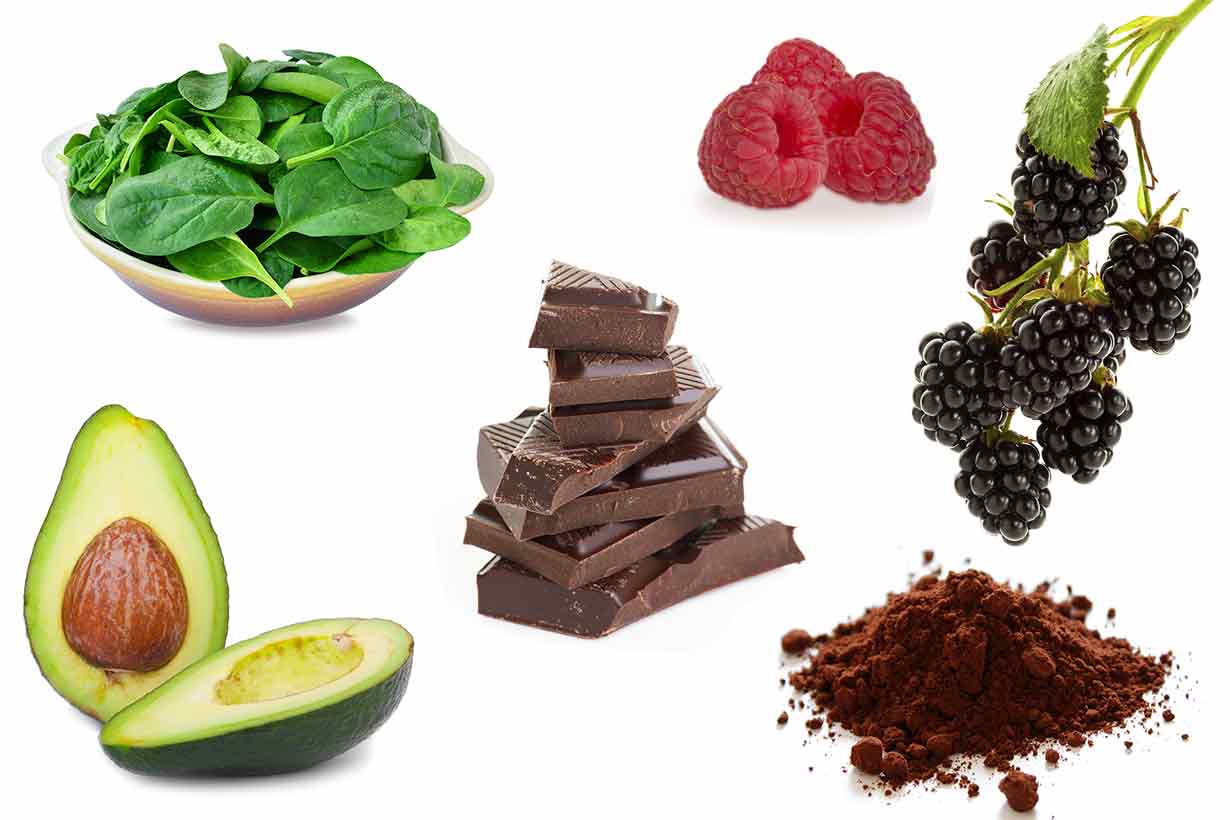Can vegetables fit into a low-carbohydrate dietary pattern?
The short answer is yes.
However, focusing on lower-carb vegetable options makes meeting “stricter” carbohydrate intake targets easier.
This also allows more room for including other carbohydrate sources in the diet.
This article presents a list of some of the lowest-carb vegetable options.
Low Carb Vegetables

For each vegetable, carbohydrate, fiber, and ‘net carb’ data is available ‘per 100 grams’ and ‘per serving.’
‘Net carbs’ refers to the digestible carbohydrate content of food after deducting fiber from total carbohydrates.
The source of all nutritional information is the USDA’s FoodData Central database.
1) Asparagus (raw weight)
| Name | Per 100 Grams | Per 135-gram Cup |
|---|---|---|
| Total carbohydrates | 3.88 g | 5.24 g |
| Fiber | 2.1 g | 2.84 g |
| Net carbs | 1.78 g | 2.40 g |
| Calories | 20 kcal | 27 kcal |
Asparagus contains a minimal amount of carbohydrates, most of which come from dietary fiber.
A 135-gram cup of asparagus provides 5.24 grams of carbohydrates, including 2.84 grams of fiber (1).
2) Bamboo Shoots (cooked)
| Name | Per 100 Grams | Per 155-gram Cup |
|---|---|---|
| Total carbohydrates | 3.13 g | 4.85 g |
| Fiber | 1.4 g | 2.17 g |
| Net carbs | 1.73 g | 2.68 g |
| Calories | 41 kcal | 64 kcal |
Bamboo shoots are a popular food in several Asian cuisines and are very low in carbohydrates.
A 155-gram cup serving of bamboo shoots contains only 4.85 grams of carbohydrates, with 2.17 grams from fiber (2).
3) Beet Greens (raw weight)
| Name | Per 100 Grams | Per 38-gram Cup |
|---|---|---|
| Total carbohydrates | 4.33 g | 1.64 g |
| Fiber | 3.7 g | 1.41 g |
| Net carbs | 0.63 g | 0.23 g |
| Calories | 22 kcal | 8 kcal |
Beet greens are a common leafy green vegetable with a really low carbohydrate content.
A cup of raw beet greens contains only 1.64 grams of carbs, with 1.41 grams coming from fiber (3).
4) Bell Pepper (red, raw weight)
| Name | Per 100 Grams | Per 120-gram Bell Pepper |
|---|---|---|
| Total carbohydrates | 6.03 g | 7.24 g |
| Fiber | 2.1 g | 2.52 g |
| Net carbs | 3.93 g | 4.72 g |
| Calories | 26 kcal | 31 kcal |
Despite their mildly sweet taste, a red bell pepper contains only minimal carbohydrate levels.
A typical 120-gram red bell pepper has 7.24 grams of carbohydrates, over a third of which is fiber.
5) Bok Choy (raw weight)
| Name | Per 100 Grams | Per 70-gram Cup |
|---|---|---|
| Total carbohydrates | 2.18 g | 1.53 g |
| Fiber | 1.0 g | 0.7 g |
| Net carbs | 1.18 g | 0.83 g |
| Calories | 13 kcal | 9 kcal |
Also known as pak choi, bok choy is a popular variety of Chinese cabbage.
A 70-gram cup of shredded bok choy has a carbohydrate content of only 1.53 grams (5).
Furthermore, approximately half of the carbohydrate in bok choy is from fiber.
6) Broccoli (raw weight)
| Name | Per 100 Grams | Per 70-gram Cup |
|---|---|---|
| Total carbohydrates | 6.27 g | 4.76 g |
| Fiber | 2.4 g | 1.82 g |
| Net carbs | 3.87 g | 2.94 g |
| Calories | 39 kcal | 30 kcal |
Broccoli is a cruciferous vegetable with a relatively low carbohydrate content of 4.76 grams per 76-gram cup serving (6).
7) Broccoli Raab (raw weight)
| Name | Per 100 Grams | Per 40-gram Cup |
|---|---|---|
| Total carbohydrates | 2.85 g | 1.14 g |
| Fiber | 2.7 g | 1.08 g |
| Net carbs | 0.15 g | 0.06 g |
| Calories | 22 kcal | 9 kcal |
Also known as rapini, and despite the name, broccoli raab is an altogether different vegetable from regular broccoli.
However, it has an even lower carbohydrate content.
A 40-gram serving of broccoli raab contains 1.14 grams of carbohydrates, mostly fiber (7).
8) Brussels Sprouts
| Name | Per 100 Grams | Per 90-gram Cup |
|---|---|---|
| Total carbohydrates | 8.95 g | 8.06 g |
| Fiber | 3.8 g | 3.42 g |
| Net carbs | 5.15 g | 4.64 g |
| Calories | 43 kcal | 39 kcal |
Brussels sprouts are another low-carb cruciferous vegetable.
A 90-gram cup serving of Brussels sprouts has a total carbohydrate content of 8.06 grams, nearly half of which is fiber (8).
9) Cabbage (raw weight)
| Name | Per 100 Grams | Per 90-gram Cup |
|---|---|---|
| Total carbohydrates | 5.8 g | 5.22 g |
| Fiber | 2.5 g | 2.25 g |
| Net carbs | 3.3 g | 2.97 g |
| Calories | 25 kcal | 23 kcal |
Green cabbage has 5.22 grams of carbohydrates per 90-gram cup serving, with almost half of this coming from fiber (9).
10) Carrots (raw weight)
| Name | Per 100 Grams | Per 60-gram Carrot |
|---|---|---|
| Total carbohydrates | 9.58 g | 5.75 g |
| Fiber | 2.8 g | 1.68 g |
| Net carbs | 6.78 g | 4.07 g |
| Calories | 41 kcal | 25 kcal |
Although they contain a bit more carbohydrates than most green vegetables, carrots are moderately low-carb vegetables.
A regular 60-gram carrot contains 5.75 grams of carbohydrates (10).
11) Cauliflower (raw weight)
| Name | Per 100 Grams | Per 110-gram Cup |
|---|---|---|
| Total carbohydrates | 4.97 g | 5.47 g |
| Fiber | 2.0 g | 2.2 g |
| Net carbs | 2.97 g | 3.27 g |
| Calories | 25 kcal | 28 kcal |
Cauliflower is one of the more popular low-carb vegetables and has a versatile range of uses.
For instance, ‘cauliflower rice is a popular rice alternative for those looking to reduce their carbohydrate intake.
A 110-gram cup of cauliflower provides 5.47 grams of carbohydrates (11).
12) Chili Peppers (raw weight)
| Name | Per 100 Grams | Per 15-gram Chili Pepper |
|---|---|---|
| Total carbohydrates | 7.66 g | 1.15 g |
| Fiber | 2.2 g | 0.33 g |
| Net carbs | 5.46 g | 0.82 g |
| Calories | 34 kcal | 5 kcal |
Very small quantities of chili peppers can enhance the taste of a dish, which means few calories (and minimal carbohydrates).
A 15-gram chili pepper contains 1.15 grams of carbohydrates (12).
13) Collard Greens (raw weight)
| Name | Per 100 Grams | Per 36-gram Cup |
|---|---|---|
| Total carbohydrates | 5.42 g | 1.95 g |
| Fiber | 4.0 g | 1.44 g |
| Net carbs | 1.42 g | 0.51 g |
| Calories | 32 kcal | 12 kcal |
Like most leafy green vegetables, the small carbohydrate content of collard greens is mostly fiber.
A 36-gram cup of collards provides less than two grams of dietary carbohydrates (13).
14) Eggplant (raw weight)
| Name | Per 100 Grams | Per 80-gram Cup |
|---|---|---|
| Total carbohydrates | 5.88 g | 4.7 g |
| Fiber | 3.0 g | 2.4 g |
| Net carbs | 2.88 g | 2.3 g |
| Calories | 25 kcal | 20 kcal |
Eggplant is another good low-carb vegetable option; it has 4.7 grams of carbohydrates per cup.
Furthermore, more than half of the carbohydrate content is fiber (14).
15) Kale (raw weight)
| Name | Per 100 Grams | Per 25-gram Cup |
|---|---|---|
| Total carbohydrates | 4.42 g | 1.1 g |
| Fiber | 4.1 g | 1.02 g |
| Net carbs | 0.32 g | 0.08 g |
| Calories | 43 kcal | 11 kcal |
The vast majority of kale’s carbohydrate content is fiber.
Per 25-gram cup of raw kale, the vegetable provides 1.1 grams of carbohydrates, including more than a gram of fiber (15).
16) Kohlrabi (raw weight)
| Name | Per 100 Grams | Per 135-gram Cup |
|---|---|---|
| Total carbohydrates | 6.2 g | 8.37 g |
| Fiber | 3.6 g | 4.86 g |
| Net carbs | 2.6 g | 3.47 g |
| Calories | 27 kcal | 36 kcal |
A cup serving of kohlrabi provides 8.37 grams of carbohydrates; more than half of the carbohydrate content is fiber (16).
17) Mushrooms (white button, raw weight)
| Name | Per 100 Grams | Per 70-gram Cup |
|---|---|---|
| Total carbohydrates | 3.26 g | 2.28 g |
| Fiber | 1.0 g | 0.7 g |
| Net carbs | 2.26 g | 1.58 g |
| Calories | 22 kcal | 15 kcal |
Not only do white button mushrooms provide a lot of nutritional value, but they are also mainly water by weight.
Thus, these mushrooms contain very few carbohydrates (and calories).
A 70-gram cup of white button mushrooms provides 2.28 grams of carbohydrates (17).
18) Okra (raw weight)
| Name | Per 100 Grams | Per 8 Okra Pods (95g) |
|---|---|---|
| Total carbohydrates | 7.45 g | 7.08 g |
| Fiber | 3.2 g | 3.04 g |
| Net carbs | 4.25 g | 4.04 g |
| Calories | 33 kcal | 31 kcal |
A serving of eight okra pods provides 7.08 grams of carbohydrates, of which 3.04 grams are fiber (18).
19) Pumpkin (raw weight)
| Name | Per 100 Grams | Per 116-gram Cup |
|---|---|---|
| Total carbohydrates | 6.5 g | 7.54 g |
| Fiber | 0.5 g | 0.58 g |
| Net carbs | 6.0 g | 6.96 g |
| Calories | 26 kcal | 30 kcal |
Pumpkin is a versatile low-carb vegetable with a carbohydrate content of 7.54 grams per cup (19).
20) Radicchio (raw weight)
| Name | Per 100 Grams | Per 40-gram Cup |
|---|---|---|
| Total carbohydrates | 4.48 g | 1.79 g |
| Fiber | 0.9 g | 0.36 g |
| Net carbs | 3.58 g | 1.43 g |
| Calories | 23 kcal | 9 kcal |
Radicchio is a popular leafy green vegetable that has a small carbohydrate provision.
A cup of radicchio contains only 1.79 grams of carbohydrates (20).
21) Radish (raw weight)
| Name | Per 100 Grams | Per 115-gram Cup |
|---|---|---|
| Total carbohydrates | 3.4 g | 3.91 g |
| Fiber | 1.6 g | 1.84 g |
| Net carbs | 1.8 g | 2.07 g |
| Calories | 16 kcal | 18 kcal |
Radishes are a great low-carb vegetable option with only 3.91 grams of carbohydrates per cup.
Approximately half of the carbohydrate content of radish is fiber (21).
22) Savoy Cabbage (raw weight)
| Name | Per 100 Grams | Per 70-gram Cup |
|---|---|---|
| Total carbohydrates | 6.1 g | 4.27 g |
| Fiber | 3.1 g | 2.17 g |
| Net carbs | 3.0 g | 2.10 g |
| Calories | 27 kcal | 19 kcal |
A cup serving of savoy cabbage provides 4.27 grams of carbohydrates, approximately half of which are fiber (22).
23) Scallions (raw weight)
| Name | Per 100 Grams | Per 100-gram Cup |
|---|---|---|
| Total carbohydrates | 7.34 g | 7.34 g |
| Fiber | 2.6 g | 2.6 g |
| Net carbs | 4.74 g | 4.74 g |
| Calories | 32 kcal | 32 kcal |
Scallions, also known as green or spring onions, are moderately low-carb vegetables.
Each cup of scallions contains 7.34 grams of carbohydrates, which includes 2.6 grams of fiber (23).
24) Seaweed (dried, raw weight)
| Name | Per 100 Grams | Per 2 tbsp (10g) Serving |
|---|---|---|
| Total carbohydrates | 5.11 g | 0.51 g |
| Fiber | 0.3 g | 0.03 g |
| Net carbs | 4.81 g | 0.48 g |
| Calories | 35 kcal | 4 kcal |
Seaweed is a low-carb-friendly vegetable from the sea.
A typical two-tablespoon serving (10g) of dried seaweed laver contains only 0.51 grams of carbohydrates (24).
25) Spinach (raw weight)
| Name | Per 100 Grams | Per 30-gram Cup |
|---|---|---|
| Total carbohydrates | 3.63 g | 1.09 g |
| Fiber | 2.2 g | 0.66 g |
| Net carbs | 1.43 g | 0.43 g |
| Calories | 23 kcal | 7 kcal |
Spinach is a nutrient-rich leafy green with a small amount of carbohydrates.
A cup of spinach provides 1.09 grams of carbohydrates, over half of which comes from fiber (25).
26) Swiss Chard (raw weight)
| Name | Per 100 Grams | Per 36-gram Cup |
|---|---|---|
| Total carbohydrates | 3.74 g | 1.35 g |
| Fiber | 1.6 g | 0.58 g |
| Net carbs | 2.14 g | 0.77 g |
| Calories | 19 kcal | 7 kcal |
Swiss chard is another low-carb leafy green vegetable.
A cup of swiss chard contains 1.35 grams of carbohydrates (26).
27) Tomatoes (raw)
| Name | Per 100 Grams | Per 60-gram Tomato |
|---|---|---|
| Total carbohydrates | 4.04 g | 2.42 g |
| Fiber | 1.2 g | 0.72 g |
| Net carbs | 2.84 g | 1.7 g |
| Calories | 20 kcal | 12 kcal |
Although tomatoes are botanically a fruit (see low-carb fruit here), they are usually classed as a vegetable for culinary purposes.
A 60-gram tomato has a carbohydrate content of only 2.42 grams (27).
28) Turnip (raw weight)
| Name | Per 100 Grams | Per 130-gram Cup |
|---|---|---|
| Total carbohydrates | 6.43 g | 8.36 g |
| Fiber | 1.8 g | 2.34 g |
| Net carbs | 4.63 g | 6.02 g |
| Calories | 28 kcal | 36 kcal |
Turnips provide a relatively low-carbohydrate content of 8.36 grams per cup (28).
29) Turnip Greens (raw weight)
| Name | Per 100 Grams | Per 55-gram Cup |
|---|---|---|
| Total carbohydrates | 7.13 g | 3.92 g |
| Fiber | 3.2 g | 1.76 g |
| Net carbs | 3.93 g | 2.16 g |
| Calories | 32 kcal | 18 kcal |
The leafy part of the turnip plant, known as turnip greens, is a nutrient-rich leafy green vegetable.
A cup serving of turnip greens offers 3.92 grams of dietary carbohydrates (29).
30) Watercress
| Name | Per 100 Grams | Per 34-gram Cup |
|---|---|---|
| Total carbohydrates | 1.29 g | 0.44 g |
| Fiber | 0.5 g | 0.17 g |
| Net carbs | 0.79 g | 0.27 g |
| Calories | 11 kcal | 4 kcal |
Watercress is 95% water, thereby containing minimal carbohydrate and calorie levels.
A cup of watercress contains only 0.44 grams of carbohydrates (30).
Final Thoughts
As this list of low-carb vegetables demonstrates, vegetables can fit into even the strictest of low-carb diets.
These vegetables have a low-carbohydrate content and contribute a broad range of vitamins and minerals.




